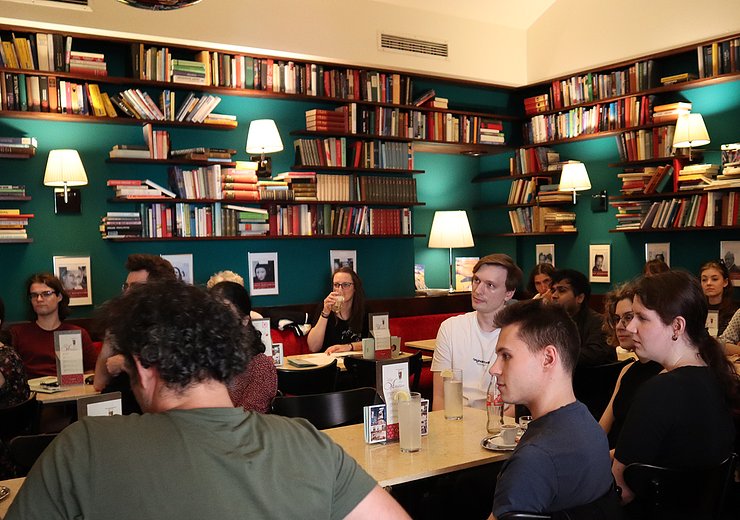LogicLounge 2024 with Georg Gottlob
At this year’s Logic Lounge, Georg Gottlob gave insights into Artificial Intelligence and Artificial Ignorance.

Together with Georg Gottlob, this year’s LogicLounge, which is organized by the Vienna Center for Logic and Algorithms (VLCA), explored Artificial Intelligence’s current state and challenges. It provided insights into the two main branches of AI research: symbolic AI, which predominantly focuses on knowledge representation and logical reasoning (KRR), and sub-symbolic AI, which primarily centers on Machine Learning (ML). This year’s LogicLounge, which celebrates its 10th anniversary, took place on May 28 in an intimate atmosphere (the Extrazimmer) at Café Museum, a spot that has already served as a rendezvous point for Wittgenstein and the Vienna Circle. For the third time, it was moderated by journalist Sarah Kriesche.
Through sometimes amusing, sometimes concerning anecdotes, renowned computer scientist Georg Gottlob brought the world of Machine Learning (ML) and Large Language Models (LLMs) alive for his audience.
“The ghost of the previous tenant still lived in the house.”
With this statement, Georg Gottlob took his audience right back with him to his time in Oxford, where he applied for a credit card soon after having arrived there. After checking in with the credit card company, he was shocked to learn that his credit limit was – quite - abysmal. What he didn’t know (but soon found out through payment requests that landed on his doorstep) was that the previous tenant of his idyllic new home had tended to leave his bills unpaid. The scientist in Georg Gottlob ultimately figured that his own low credit score was simply because of the AI-based system that the rating agency was using. Why? Because the AI-based system (so Gottlob’s hypothesis) simply did not know that the tenant of a house or flat (usually) moves out as soon as a new tenant moves in – and so the premise of Gottlob’s own credit score was still dependent on the (as mentioned, abysmal) credit score of the previous tenant. While the system’s conclusion that people who live in the same neighborhood have similar payment habits is not to be dismissed entirely, it is still highly questionable from an ethical point of view.
Think of AI like the two hemispheres of our brain
Gottlob further dove into other limitations of AI-based applications and provided anecdotes and personal experiences ranging from self-driving cars (he is looking forward to sending his car on its way to park itself – without him in it) to superior chess computers. There are, however, also potentials within AI that have not yet been fully explored, for example when it comes to combining sub-symbolic AI and symbolic AI. To better understand what combining these two approaches could look like, Gottlob made a simple analogy to our (human!) brain: Imagine two halves of the human brain that are responsible for different tasks. With sub-symbolic AI (right hemisphere), the focus is on ML, i.e., on processing huge amounts of data using neural networks. This form of AI is perfectly suited for a medical use-cases, like in medical diagnostics. Symbolic AI (left hemisphere), on the other hand, deals with fact- and rule-based conclusions. One question still remains though: Who decides which rules are used? And who decides who decides?
If we made you curious, you can watch the whole LogicLounge2024 on VCLA’s YouTube channel:
Watch on YouTube: https://youtu.be/pvhmmYARBj0
About Logic Lounge
The series of public lectures LogicLounge continues to bring together the general public and experts from the fields of logic, philosophy, mathematics, computer science, and artificial intelligence. Since its inception at the Vienna Summer of Logic in 2014 – the largest event in the history of logic – the series has since been traveling between Vienna and the venue of the CAV (International Conference on Computer-Aided Verification), where it has already become a regular event in honor of Helmut Veith (1971-2016).
About Georg Gottlob
Georg Gottlob earned his Ph.D. in Computer Science from TU Wien in 1981. Following academic appointments in Milan, Genoa, and Stanford, he was named a full professor of Informatics at TU Wien in 1988. In 2006, he accepted a position at Oxford University while maintaining strong ties to TU Wien as an Adjunct Professor in Logic and Computation and Information System Engineering. Between 2006 and 2011, he served as the Chair of Computing Science at Oxford University and subsequently assumed the Chair of Informatics in January 2012. Currently, Georg is a Professorial Fellow at St John’s College, Oxford, and holds a chaired professorship at the University of Calabria in Italy.
An esteemed scholar, Georg has contributed over 250 scientific articles to computational logic, database theory, and artificial intelligence and authored a textbook on logic programming and databases. His work has earned him numerous accolades, including the Wittgenstein Award from the FWF, the ERC Advanced Investigators Grant, and the Ada Lovelace Medal from the British Computer Society. He is recognized as an ACM Fellow, an ECCAI Fellow, a Fellow of the Royal Society, and a member of the Austrian, German, and European Academies of Sciences. In addition to his research contributions, Georg is actively involved in various advisory boards and serves on the editorial boards of several leading journals, including JCSS and CACM, demonstrating his commitment to advancing excellence in research.
Curious about our other news? Subscribe to our news feed, calendar, or newsletter, or follow us on social media.



